"Events are boosters for innovation and creativity"
Interview with Petra Hedorfer (DZT) and Matthias Schultze (GCB)
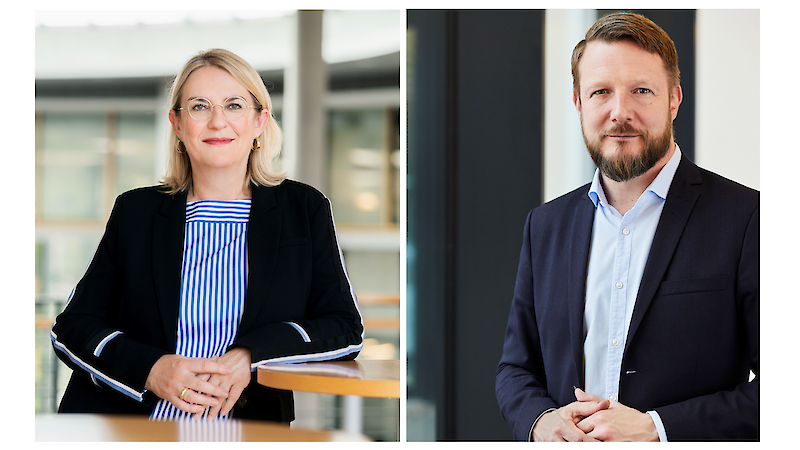 © DZT, Farideh Diehl / GCB, Michael Pasternack
© DZT, Farideh Diehl / GCB, Michael Pasternack
In a double interview on the occasion of IMEX Frankfurt 2022, Petra Hedorfer, CEO of the German National Tourist Board, and Matthias Schultze, Managing Director of the GCB German Convention Bureau, talk about sustainability in the MICE industry, the relevance of open data and the future of Germany as a meetings destination, among other topics.
Ms Hedorfer, Mr Schultze, after two years of virtual contact only, IMEX is currently taking place in Frankfurt and is the first opportunity for MICE sector representatives to meet up in person. What are your expectations for the event?
PETRA HEDORFER: Just a few weeks ago, we were able to hold our Germany Travel MartTM – the largest inbound tourism event for the leisure sector – in person again for the first time after being confined to online events for two years. That was a great way to kick off the restart of Destination Germany.
The last couple of years have taught us to appreciate how quick and efficient virtual events can be, but we all feel a strong sense of longing for personal interaction and the atmosphere of a face-to-face event, which is simply impossible to recreate in a virtual space.
Our partners in the international and the German travel industries alike have reaffirmed how important personal contact is to them. This sense of longing has resulted in significant pent-up demand, including in the business travel segment.
IMEX will thus send another important, positive signal to everyone in the MICE sector. The coronavirus pandemic has further highlighted the economic importance of Germany as a destination for conferences and conventions over the last two years. Game changers that existed before the pandemic, for example technological innovations such as virtual conferencing technology, and also the transition to a greener economy, are shaping a ‘new normal’ for the MICE sector.
One aspect on which my expectations for the 2022 IMEX are focused is new customer business. First-timers are key in this very fast-moving business environment. Another aspect that is important to me is finding ways to effectively address the crucial topic of sustainability as an integral element of the future of business travel. In this transformation process, the focus is increasingly shifting towards striking a good balance. It is not enough to simply declare that virtual formats are a substitute for face-to-face meetings. Hybrid formats, for example, can increase the reach of an event while also addressing the need for in-person meet-ups. With regard to the carbon footprint, we need to strike a balance between efficiency and environmental responsibility.
MATTHIAS SCHULTZE: The market for business events has changed rapidly over the past two years, in both quantitative and qualitative terms. Transformation processes that had already begun before the pandemic have been accelerated dramatically. IMEX Frankfurt, which is celebrating its 20th anniversary this year, will reflect the current industry conditions. Germany is a leading destination for conferences and conventions, with a strong sustainability profile, and thus offers perfect conditions for pioneering events. This is something we want to discuss with all relevant stakeholders at IMEX as we look ahead to explore future trends and new perspectives.
The coronavirus pandemic initially led to tough restrictions on international tourism as a whole, and the MICE sector was particularly hard hit. Are you starting to see light at the end of the tunnel?
PETRA HEDORFER: There are a number of significant trends that have been emerging over the past decade and thus set in well before the outbreak of the pandemic. The decline in traditional business travel is one of these. In the trade fair business, we were seeing a big shift towards more specialised events that are embedded in research.
The lockdowns acted like a big reset for the entire tourism sector. In 2020, the first year of the pandemic, holiday travel and business travel were down by 67 per cent and 65 per cent respectively, so the impact on both segments was almost equally severe.
But in 2021, the second year of the pandemic, we saw a much more nuanced picture, at least with regard to inbound travel to Germany from other European countries. Holiday travel gradually recovered when the lockdown was lifted (up by 5 per cent), while business travel continued to decline (down by 12 per cent).
Nevertheless, Germany was able to maintain its leading position as the number one business travel destination for Europeans even during the pandemic. Of the 29.7 million business trips made by Europeans in 2021, around 4.4 million were to Germany, followed by France with 2.4 million and Italy with 2.3 million.
And the outlook for 2022 generally remains positive: Studies by IPK International found that 23 per cent of global survey respondents had plans to undertake international business trips. In Asia and the Americas, the intention to travel for business is significantly more widespread (38 per cent and 33 per cent respectively) than in Europe (14 per cent), which is further evidence of pent-up demand.
MATTHIAS SCHULTZE: Our market research confirms that the outlook for the future is positive. Our most recent meetings and events barometer showed that providers and organisers are expecting steady growth in the coming years across all formats – in-person, hybrid and virtual events.
The transformation of the market is also being influenced by current events. In a new study commissioned by the GCB, Oxford Economics offers three forecast scenarios that take account of the further course of the coronavirus pandemic, disruptions in international supply chains and the war in Ukraine. In the baseline scenario, the analysts predict that the market will have largely recovered by 2024 in terms of numbers of event participants.
At the start of the pandemic, many experts were saying that a significant proportion of the business travel market would be lost to the virtual sphere for good. Now, business travel is making a return. How has demand changed during the two and a half years of the pandemic?
MATTHIAS SCHULTZE: How and when people get together has been changing dramatically for some time. Megatrends like digitalisation, sustainability, innovative ways of working and internationalisation, for example, have had a big impact in this regard. But fundamentally, business events will remain a relevant part of the communications toolbox for organisations – one that can help to develop solutions for complex issues.
The meetings and events barometer showed that the number of participants attending events in person went back up last year. This is attributable not only to events that were being hosted exclusively as in-person events but also to a sharp rise in the number of people opting to physically attend hybrid events. Of the 68.4 million people who physically attended a business event in 2021, 50 million attended in-person only events (2020: 60 million) and 18.4 million attended hybrid events (2020: 1.8 million). So, while the number of people attending in-person only events declined slightly as a result of the pandemic, hybrid formats, i.e. in-person events with the option to participate online instead, became a market driver. If we look at the forecasts of providers and organisers for the coming years, we can see that virtual formats will remain relevant, but that the market definitely anticipates a strong comeback of face-to-face meetings, conferences and conventions.
Safety is also an important topic in this context. Especially in light of the huge demand for meetings in person, safety and hygiene protocols are a key priority for business travellers and event participants. This is why we have launched the #SafeBusinessTrips campaign in collaboration with the GNTB. The platform by the same name offers extensive and transparent information from providers covering the entire delegate journey.
PETRA HEDORFER: In the years that we have spent living with the pandemic, trends that had begun to emerge beforehand have accelerated significantly. Of course, traditional business travel will pick up again. But, realistically, we expect virtual alternatives to continue to play a more dominant role in the market in areas where they have proven effective.
This is also a great example of the interests of digitalisation and sustainability coinciding. The business travel sector, in particular, is likely to be increasingly affected by the fact that more and more companies are applying ESG criteria and aiming to constantly improve their sustainability performance. Going forward, travel management will therefore place greater emphasis on the environmental footprint in business decisions and consider carbon emissions in the cost calculation. Business trips will come under closer scrutiny, both from a cost/benefit perspective and in terms of their environmental impact. This is a trend that the MICE sector will need to take into account when it plans what it is going to offer. Environmental impact, comfort level, service quality and value for money will need to be balanced in a way that matches the demand in the market.
Demand can also be stimulated by innovative new offerings. What can we look forward to?
MATTHIAS SCHULTZE: The future of business events will be shaped by a large number of factors such as sustainability, digitalisation, transport trends, changes in the way we work, and changes in political and economic conditions.
In addition, the increasing level of differentiation across the spectrum of event formats means that we need to find ways to carefully arrange, emotionally orchestrate and intelligently combine virtual and analogue event components. The delegate journeys of online and offline participants are extremely different and our challenge is to tailor them perfectly. In addition, events of the future will no longer be self-contained happenings that are separate from other communication channels. Instead, they will be part of an organisation’s multisensory omnichannel marketing strategy. We expect to see events moving into something of a ‘loop’ that will allow companies to build a community and constantly maintain the visibility of their brand throughout the year. The hybridisation of events has the potential to expand their reach enormously.
For destinations, authenticity is the new currency. Every region, every city and every location that Germany has to offer as a destination for conferences and conventions is unique and distinctive. The country’s appeal in this context is attributable in part to its strong position in many important economic sectors and scientific fields, but also to a diverse palette of regional features. Showcasing these and creating an enticing proposition for discovery with a distinctive local flavour presents a huge opportunity for organisers, service providers and destination marketing organisations alike.
Transformative processes in the work environment also have an impact on the ways in which people meet and interact. Trends in relation to the New Work concept, a sharp increase in the proportion of time spent working from home and the emergence of other remote working models are fuelling the appetite for in-person contact. This is a source of enormous potential for new event formats, for example when it comes to designing creative spaces in which teams that mainly work remotely can come together.
Looking ahead, what role do you think promotable business travel may play in the context of international tourism as a whole and in relation to different forms of in-person communication?
PETRA HEDORFER: The last two years have shown that conventional meetings can very easily be replaced with digital alternatives. But that does not eliminate people’s desire to have face-to-face contact. Spontaneous meet-ups and chance encounters and personal interactions at events are catalysts for innovation and creativity.
And in many areas, innovation and creativity are becoming ever more important, as New Work concepts like agile management, new ways of collaborating within teams, remote working and working from home are gaining a stronger foothold. Options for onward travel, for example, will become a relevant factor in the selection of locations for business events.
In principle, remote working models completely dispense with the need to be physically present in the workplace. As a result, the balance between business, personal commitments and leisure is shifting and the lines are becoming more blurred. At the same time, in-person communication takes on a completely new role in this new work environment. Workshops, seminars, training courses, etc. become crucial team-building opportunities that boost motivation and sustain the team during the next period of remote work.
There is a broad social consensus that tourism needs to become more sustainable. But, given the choice, most customers ultimately tend to choose the most cost-efficient option. Do you believe that the MICE sector has a duty to design its offerings in a way that directs the decisions of customers towards sustainable alternatives?
PETRA HEDORFER: I absolutely acknowledge that duty. From a sustainability perspective, we are in a good position as a destination. In the SDG index that indicates the extent to which the UN member states included in the comparison meet UN climate goals, we were ranked fourth in 2021.
Nonetheless, we still need to strike a delicate balance between economic, social and environmental factors. The policy objectives that the government has set out in its coalition agreement provide clear guidance for us. The onus is on everyone in our industry to make Germany a sustainable, climate-friendly, fair and innovative tourism destination after the pandemic.
This aligns very well with the core message of our brand. ‘Germany simply inspiring’ stands for sustainability, spontaneous encounters, a friendly atmosphere, real-world inspiration, authenticity and responsibility – whether you are travelling for business or for leisure. With regard to promotable business travel, this means proactively offering ways to combine business and leisure travel, incorporating add-on days before and after events into the programme, and promoting onward travel options that, in turn, extend the visitors’ total stay in the country.
We all know that international travel plays an important role in encouraging progress, cultural exchange and understanding among nations. It is the key to economic prosperity and essential for knowledge sharing. However, travel is also a source of carbon emissions. In order to provide value, we must therefore balance our endeavours with a sense of responsibility. If we as an industry offer sustainable products and services that are robust and credible, we will be able to boost demand and, at the same time, make a contribution to combating climate change. This in turn will enable us to enhance the image of Germany as a travel destination.
The MICE sector has been doing its homework. That is very clear from the many examples of best practice, such as the German Environmental Award presented by the German Federal Environmental Foundation, or the Green Note scheme for certifying green meetings. In this regard, the sector as a whole is already actively contributing to combating climate change. By running the GTM as a green event, we are also leading by example.
MATTHIAS SCHULTZE: Germany as a conference venue is actively promoting sustainability in a number of different areas. In 2012, the GCB introduced ‘Right and Fair’, the sustainability code of the German-language events sector. It represents a voluntary commitment to corporate social responsibility for sustainability when organising and running events. By signing up to the code, companies commit to complying with guidelines that define sustainability with all its consequences as a corporate responsibility. The underlying principles of the code are based on the United Nations’ sustainable development goals (SDGs). We also train people as sustainability consultants. To date, almost 800 event professionals have taken part, enabling them to systematically implement sustainable events in their organisations.
A number of stakeholders, including the GCB, have also become supporters of the Net Zero Carbon Events initiative launched at the end of last year. Backed by the JMIC (Joint Meetings Industry Council), this initiative aims to promote international cooperation in the events industry in order to tackle and overcome the challenges of global climate change together.
The digital transformation has already permeated the entire value chain, including the customer journey – from inspiration and destination choice through event organisation to communication during events. Where do you see the next major challenges?
MATTHIAS SCHULTZE: Going forward, digital platforms will be key to finding the perfect fit between supply and demand. There is vast potential for establishing innovative formats and new business models that offer significant added value for customers. This starts with systematic data management and data profiling aimed at standardising and simplifying searches and booking processes, and extends all the way to smart meeting assistants (SMAs), which our study on the platform economy has identified as a long-term future scenario. Powered by highly advanced AI, an SMA could provide support throughout the entire customer journey – from initial enquiry to post-event evaluation. This and other tools are ultimately resources that can free us up to concentrate on what you might call the human strengths of the event world.
What could be the role of open data in this context?
PETRA HEDORFER: Open data – semantically structured machine-readable data within a knowledge graph – is a milestone for the visibility and promotion of products and services located in Germany on global platforms. The GNTB is coordinating with its German tourism partners on the development of a shared knowledge graph for Germany’s inbound tourism industry.
We have made substantial progress with this project, and it is due to be rolled out this summer. Integration, e.g. with public transport data, enables us to consistently and strategically drive forward our ambitious projects for visitor flow management. The knowledge graph allows us to develop and implement additional AI applications and also opens up opportunities for start-up enterprises.
MATTHIAS SCHULTZE: We also see great opportunities for business events here. That is why the GCB, together with the GNTB, is currently conducting detailed research into how to apply the open data project to conference venues and create real added value for all stakeholders as they look to gain market share going forward.
How does Germany currently measure up at international level? Are other global players getting the better of us, or is Germany’s quantitative position as a leading MICE destination also secure in qualitative terms?
PETRA HEDORFER: Germany’s long-standing position as a leading MICE destination stems from its traditional role as an industrial hub and cluster for scientific skills, plus its infrastructure and its geostrategic location at the heart of Europe. However, we have seen in the last two years how rapidly the parameters can change.
Digital transformation certainly represents a great opportunity for the MICE industry of the future. It also offers chances for Germany, but equally for other destinations, which means competition is going to increase. In order to remain a leader in innovation, we need both ideas and infrastructure. Without comprehensive broadband coverage and 5G as standard at venues, we will quickly lose ground. These complex challenges open up opportunities to raise our profile as a business location and innovation hub.
MATTHIAS SCHULTZE: We need to build on the strengths that have made Germany the leading global venue for conferences. Besides the factors already mentioned (infrastructure, value for money, innovative spirit and industry expertise), these certainly include the ability to respond with agility and flexibility to constantly changing parameters. In a VUCA world with complex challenges, there will not be just one single future. In the Future Meeting Space innovation network, we recently developed three separate future scenarios in which factors such as digitalisation, sustainability, and safety each play very different roles in our private and working lives. It is necessary to think in scenarios for business events too. While some may wish to see remote activity with maximum flexibility, others will prefer a personal touch in an authentic environment. In future, we need to examine these changing customer requirements in much greater detail and create the appropriate offerings. With its diverse range of offerings, Germany is already very well positioned to meet the wide-ranging demands placed on conference and convention locations.
Getting back to IMEX: most of the exhibitors at the largest industry event are destinations, hospitality and travel companies or event venues. Will the profile of IMEX change? How is marketing Germany as a MICE destination going to work in the new normal?
PETRA HEDORFER: We see IMEX as the bellwether for the international MICE business. The GCB promotes the IMEX mission with innovative formats throughout the year. The strategic partnership between the GNTB and GCB forms the basis for marketing Germany as a MICE destination of the future. Given that the future of business events increasingly relies on collaboration, the same is true of the stakeholders, of course. That includes the global presence of the GNTB, which also extends the reach of the GCB. For its part, the GCB, in interaction with partners, offers valuable impetus for the future structures within the MICE business.
Building on this close cooperation, we are already positioning Germany as a pioneer in the area of sustainable business events, and we are taking a leading role in setting out and developing our expertise as a knowledge cluster for the MICE sector in the international market. In short, our key themes – digitisation, sustainability, collaboration and internationalisation – are reflected in the evolution of IMEX and represent the global trends within the industry.
MATTHIAS SCHULTZE: IMEX shows how it is possible to strike a balance between the traditional trade fair business and innovative knowledge networking. The Germany section – at the Germany stand F100 and in the open spaces – includes more than 160 exhibitors this year. After the event had to be cancelled twice due to the pandemic, we can detect a tremendous desire for personal interaction. The traditional trade fair activities are supplemented with a number of presentations in the Communication Cube at the Germany stand, which highlights further advantages of business events: learning, knowledge sharing and new ideas. And finally, both the direct dialogue between providers and customers and IMEX’s extensive programme of supporting activities facilitate networking with existing contacts and the forging of new contacts.
Looking to the future, it will be necessary to focus even more rigorously on customer requirements – from sustainability and safety to the desire for authentic, engaging experiences. In a fluid environment, those requirements are becoming ever more differentiated. Anyone who is agile enough to react with a customised range of offerings will maintain a sustainable mindset and place themselves in a prime position within a fast-moving market. The creation of both digital and analogue products and services – and, optionally, the smart integration of the two – is the key to developing successful business events of the future.
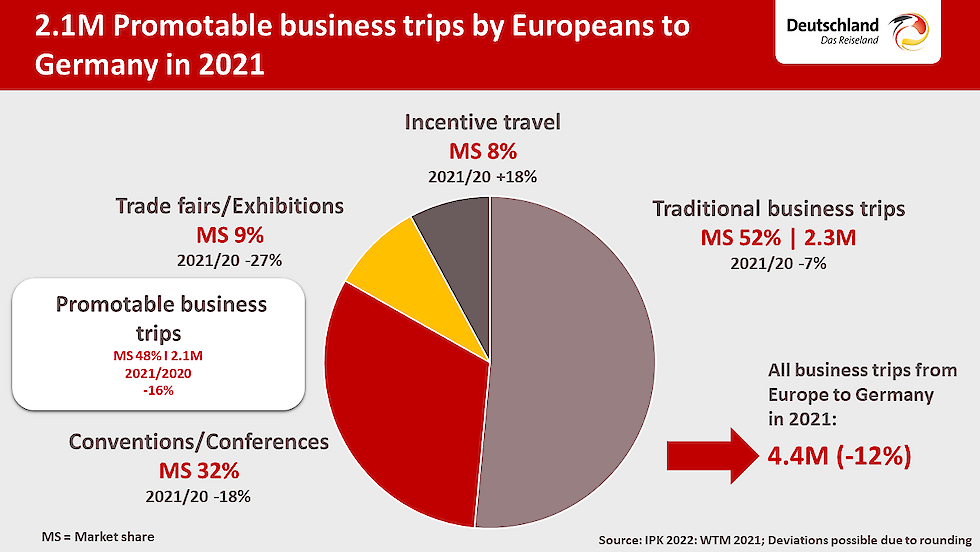
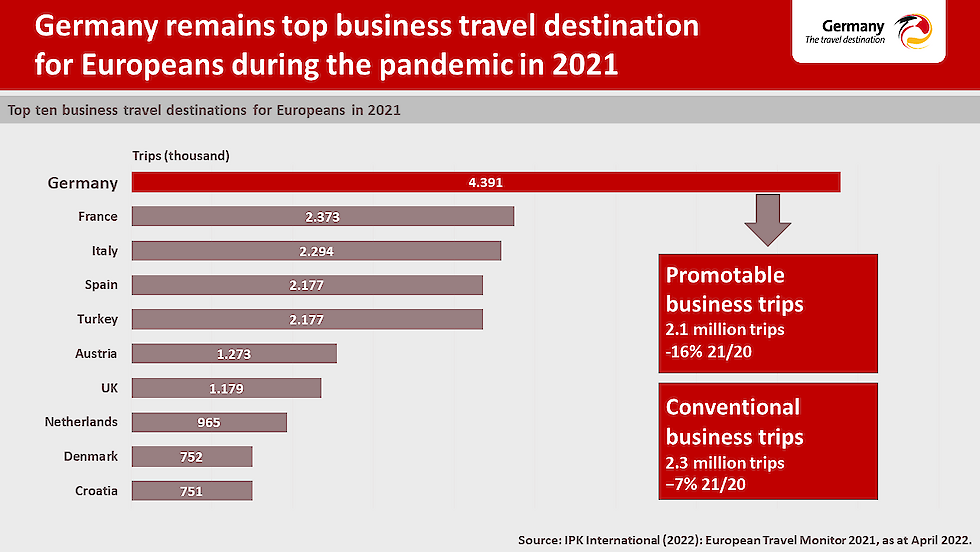
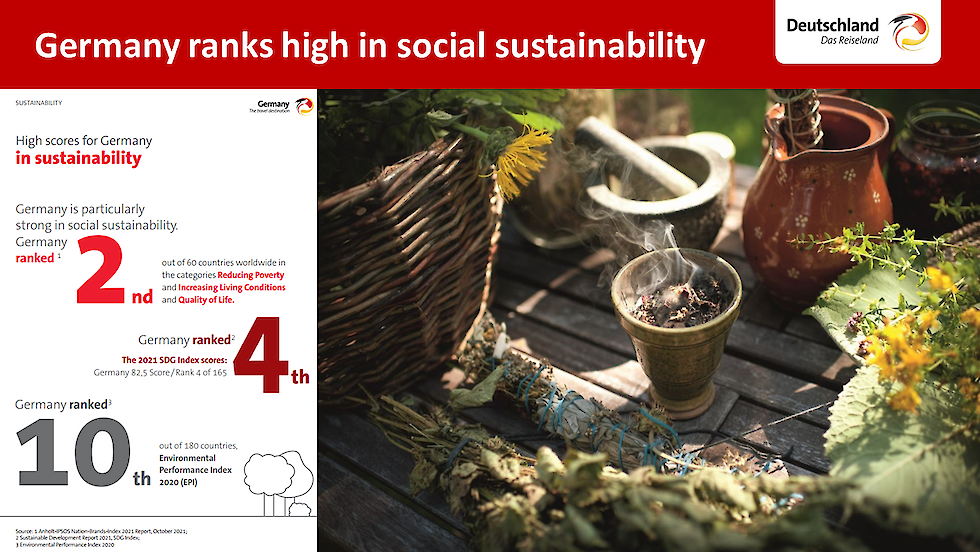
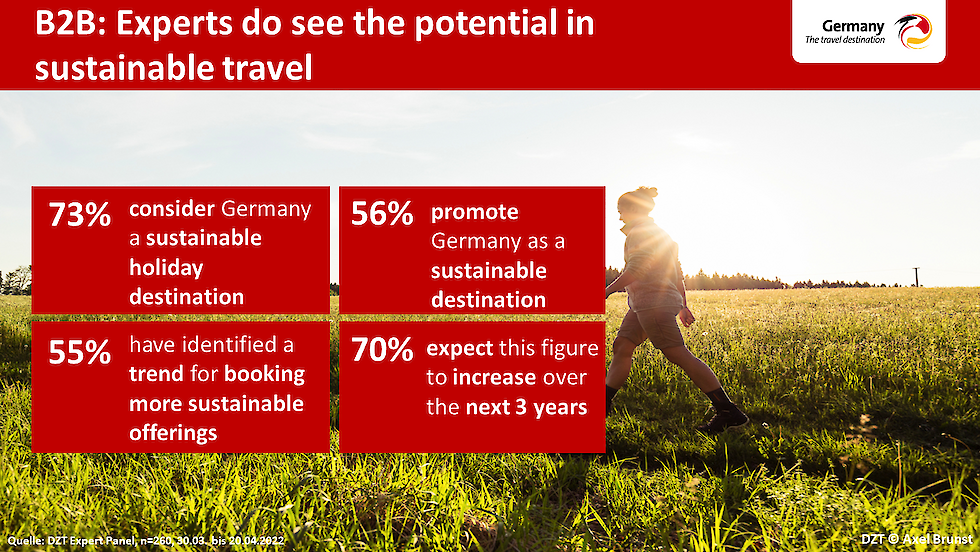
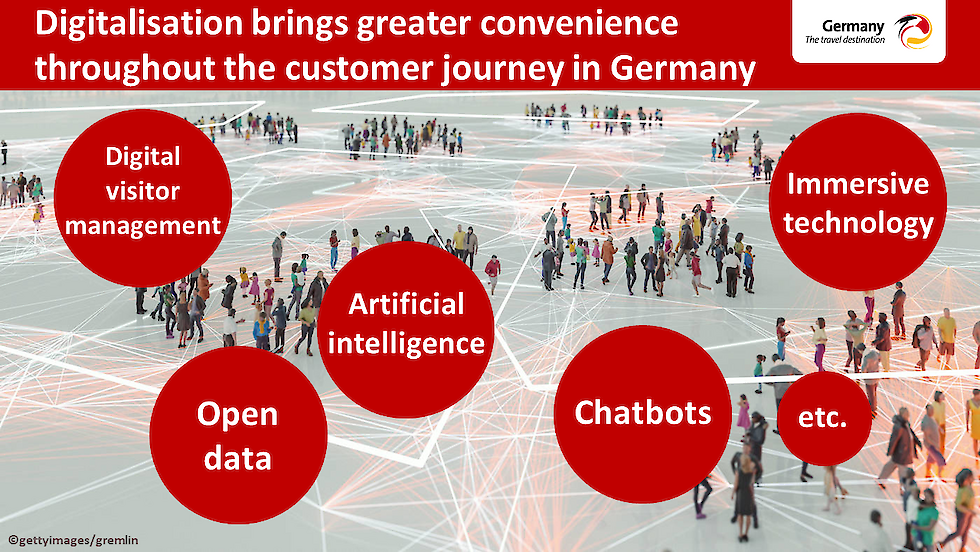
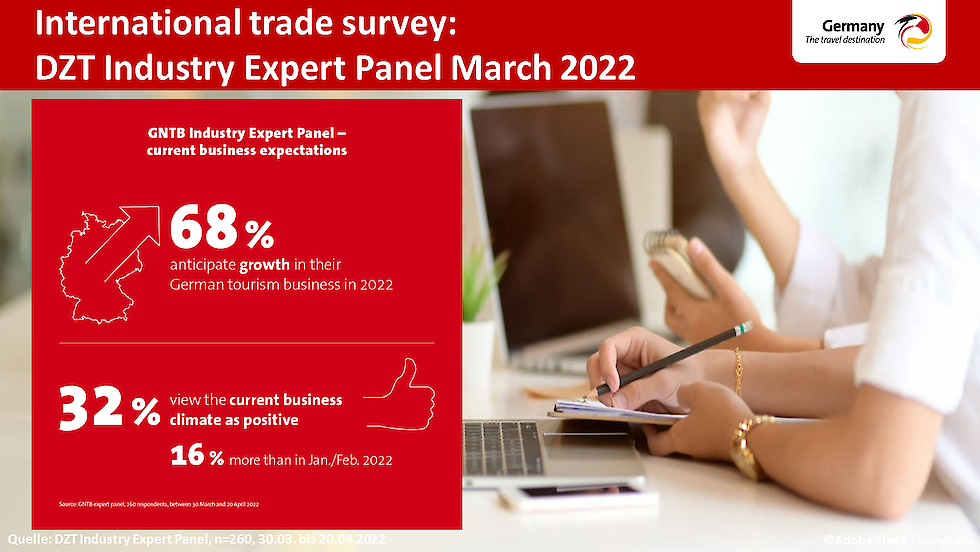
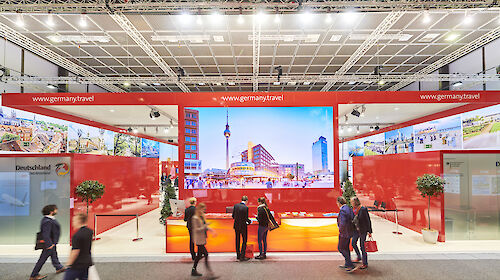 ©
©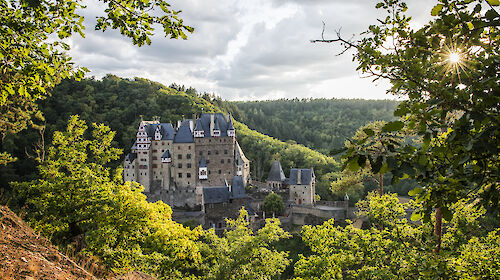 ©
©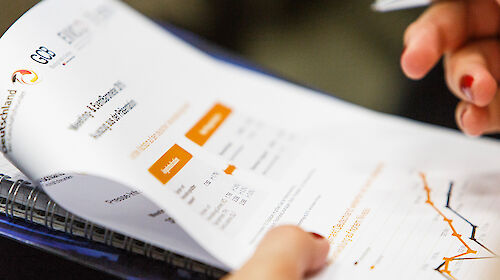 ©
©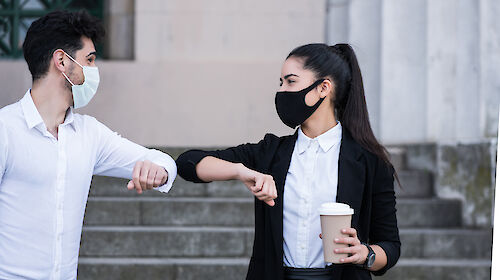 ©
©